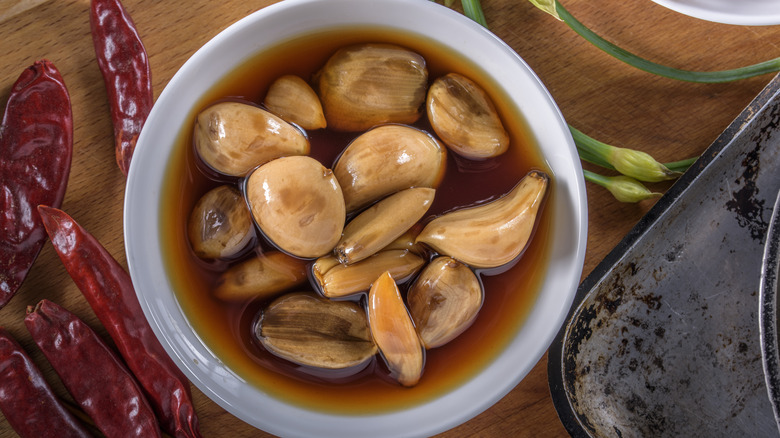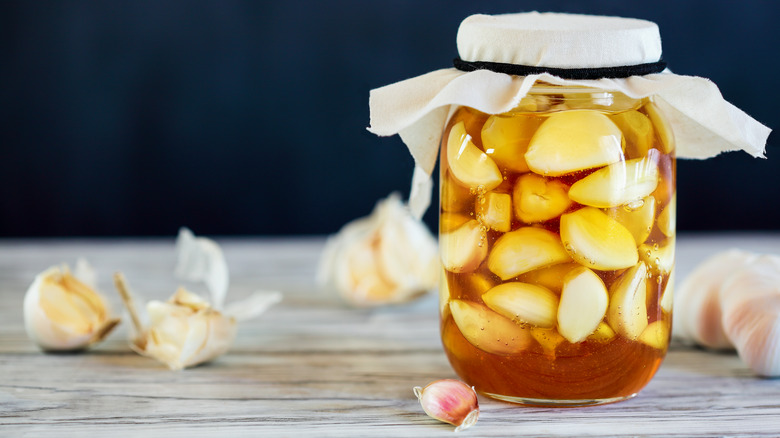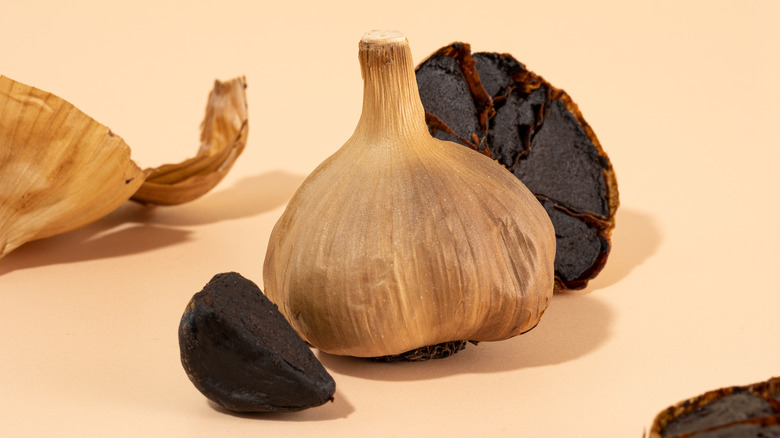What's The Difference Between Pickled And Fermented Garlic?
Fresh garlic is a staple in kitchens worldwide, and it can be preserved in two distinct ways: Pickling, and fermenting. Both of these involve different preparations and create garlic with unique but differing flavors and benefits. When done well, both techniques can turn ordinary garlic into something extraordinary, and packed with flavor.
Pickling garlic can be a surprisingly quick process: Essentially, you submerge garlic cloves in a solution of water and an acid (commonly vinegar), along with salt, sugar, and some herbs and spices for added complexity. The ratios of sugar to salt and water to vinegar can be varied depending on whether you want a pickled clove that's more salty or sweet, mild or sharp. Garlic is pickled in an acidic environment that kills bacteria, allowing you to store homemade pickled garlic for up to four months in the fridge. The pickling process alters the texture of garlic and also its flavor, typically resulting in cloves with a tangy, sharp taste that makes pickled garlic well-suited to a wide range of uses, from being a salad ingredient to a pizza topping. Humans have been pickling things for over 4,000 years and the practice has spread to every corner of the globe: There is a world beyond turning cucumbers into dill pickles, and pickled garlic is part of that world worth discovering.
Fermented garlic explained
In contrast to pickling, making fermented garlic requires more time. The garlic is left in a saltwater solution (or brine) in a loosely sealed container at room temperature; after a few days to a week, small bubbles will begin to form, letting you know that they have begun to ferment. One downside of fermenting garlic is that it requires maintenance: You need to 'burp' your garlic daily by opening the lid to release pressure that builds up inside. This is because fermentation relies on natural carbon dioxide-producing bacteria to break down sugars in the garlic, turning them into lactic acid. The garlic should be lightly fermented after two weeks, but for the best flavors, you'll need to keep them fermenting at room temperature for one or two months. However, once fermented your garlic can be stored in its brine in the fridge for up to six months, substantially longer than homemade pickled garlic.
Humans have been fermenting since the dawn of human civilization 12,000 years ago, and the process not only improves flavor but has several nutritional benefits. Just like pickling, fermenting preserves your garlic but also increases its bioactivity, enriching it with probiotics which can help to heal the gut, improve digestion, and help our bodies to absorb nutrients better. The flavor of fermented garlic is generally milder than pickled garlic, but it's also more complex in taste and aroma, making the fermented stuff suitable for a wider range of culinary uses.
Is black garlic fermented?
Black garlic is another form of garlic that's prized for its flavor and nutritional profile. Its flavor is particularly unique: Deeo, umami-rich, tangy, and somewhat sweet, making it prized in gastronomic cooking and a great way to add complexity and richness to simple ingredients like Brussels sprouts. Maybe because of its dark color and gummy texture, black garlic is often thought to be a fermented product, but this is not the case. In fact, the blackness of black garlic is due to the Maillard reaction: The same process that takes place when the outside of a steak forms a brown crust when cooked.
Black garlic takes time to make, just like fermented garlic. Instead of brining, black garlic needs to be heated to 140 F to 170 F in a humidity-controlled environment for an extended period. This is at least two weeks but can be up to 90 days or more. In this hot, humid environment the enzymes in the garlic break down. Proteins turn to amino acids, which react with the garlic's sugars, and this process gradually turns the garlic entirely black. At the same time, new interesting and unique flavor compounds are created, and that pungent, raw garlic smell and taste disappears. Black garlic is essentially just very, very slow-cooked garlic. However, unlike pickled and fermented garlic, they'll need to spend so much time aging in the oven (and in a specific, humidity-controlled environment) that they're not quite so appealing to make at home.


